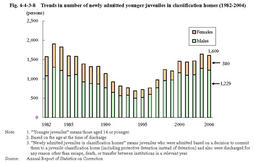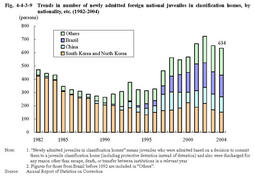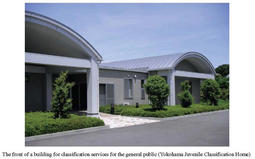| Previous Next Index Image Index Year Selection | |
|
|
5 Issues for juvenile classification homes and counter measures (1) Improvement and enhancement of the attribute classification system Recently,an increase is observed in cases where juveniles commit heinous delinquency but their motive and process towards the delinquency is hard to understand.Under these circumstances,there has been a stronger request for improvement and enhancement of the attribute classification system.
Classification is usually done by a single officer.However,when there is a need to collect a lot of information and to analyze the case multilaterally,more detailed attribute classification can be conducted by jointly investigating the case with other classification officers working for the same home or sent from other homes. Formerly,behavior observation was conducted with the naked eye by staff officials,but it was difficult to grasp and record many things in detail at one time.Therefore,for a more detailed behavior observation system,monitors are equipped to record juveniles'behavior,so as to check in detail afterwards. It is further required to enhance the attribute classification system in order to respond even to juveniles with complicated and difficult problems,by fully utilizing the limited human resources. (2) Improvement of attribute classification methods Recently,there are many juveniles who have problems with their ability to express themselves and are unable to explain their will and emotions in appropriate words.Therefore,psychological tests that are easy for juveniles to answer and are adequate for understanding their personality and characteristics have become more and more necessary.
A new method to estimate juveniles'interpersonal relationships was developed and has been conducted on a trial basis.The method aims to clarify juveniles'characteristics in building human relations by showing juveniles multiple pictures of various scenes they may actually encounter in their social life,making them consider how to respond if they were in those pictures,and making them answer not only how they feel but also how to act in such situations. It is further required to keep an eye on changes in juveniles'attributes,such as their deteriorating power of expression,and to consider introducing new test methods that will respond effectively to these changes. (3) Classification and protective detention of younger juveniles Fig.4-4-3-8 shows the number of newly admitted younger juveniles aged14or younger since1982.
The number of newly admitted younger juveniles has been on the rise since1995,and was1,609(down by2.1%from the previous year)in2004.Among them,those aged13or younger were115(84males(up by33.3%(id.)and31females(up by10.7%(id.))(Source:Annual Report of Statistics on Correction). Younger juveniles only have a limited vocabulary and poor power of expression.They often have difficulty in expressing themselves in interviews,and ordinary psychological tests are sometimes impossible due to their poor comprehension.In such cases,their psychological growth level and sense of values are assessed by interviewing them while they are making miniature gardens(Sand Play Therapy)or drawing pictures and by evaluating their work. Younger juveniles are not mature enough mentally and physically to accept various situations,and get confused easily with heightening anxiety.Therefore,it is especially important to keep them stable when placing them under protective detention.For that purpose,efforts have been made for detailed treatment,by conducting behavior observation more often to catch juveniles'subtle emotional changes for looking for appropriate measures,and by gradually eliminating their anxiety through repeated interviews. As most younger juveniles are still of school age,each juvenile classification home provides textbooks and study guides necessary for coursework and invites lecturers such as former teachers from outside to conduct classes.Furthermore,laptop personal computers are also available for studying in rooms. As an upward trend in the number of admitted younger juveniles is estimated to continue for some time,it is necessary to improve the system for younger juveniles'classification and protective detention by cooperating with and utilizing the expertise of experts in developmental psychology,child psychiatry,and other fields. Fig.4-4-3-8 Trends in number of newly admitted younger juveniles in classification homes(1982-2004) (4) Classification and protective detention of foreign national juveniles Fig.4-4-3-9 shows the number of newly admitted foreign national juveniles since1982,by nationality,etc.
The number of newly admitted foreign national juveniles has increased recently.By nationality,etc.,juveniles from South Korea and North Korea were large in number in1982,but those from China have gradually increased.In recent years,those from Brazil have increased significantly.In2004,163were from Brazil,152from South and North Korea,115from China and204from other countries. Fig.4-4-3-9 Trends in number of newly admitted foreign national juveniles in classification homes,by nationality,etc.(1982-2004) As most visiting foreign juveniles do not understand Japanese,there are many problems in their treatment.Those juveniles often have difficulties in communicating with staff officials and there occurs unexpected misunderstanding between them.Therefore,juvenile classification homes secure interpreters for smooth communication and are preparing guidebooks on life in classification homes,an answer sheet for self-report of family relations and growth history at the time of admission,and various psychological tests,translating them into various foreign languages(English,Portuguese,Spanish,Korean language,Vietnamese,Chinese,Tagalog,Russian,and Persian,etc.).Difficulties in treating visiting foreigners are not only caused by language problems but also by differences in basic lifestyles.It is further required to contrive ways for better communication by deepening understanding of their lifestyles and feelings and giving full consideration to their treatment.(5) Promotion of activities as a juvenile counseling center in local communities Juvenile classification homes are required to further promote classification services for the general public in order to return their expertise and experience concerning juvenile delinquency to local communities and play a role as a juvenile counseling center.
Juvenile classification homes have tried to make its function as a counseling center more accessible to local residents by putting up a different name sign specified for classification services for the general public,establishing a counseling room in a building separate from the main building,or providing another entrance to a counseling room in the main building. The front of a building for classification services for the general public(Yokohama Juvenile Classification Home) Cooperation between national and municipal related organizations/groups and the general public is indispensable to cope with various juvenile delinquency problems.Related organizations need to cooperate with one another to build a support system for juveniles.Juvenile classification homes also need to devise ways in various aspects to effectively function as a juvenile counseling center accessible to local residents,strengthen cooperation with related organizations to play a role in a local juvenile support system,and positively work on local communities and local residents for preventing juvenile delinquency. |


